A Live Simulcast of a Grand Opera
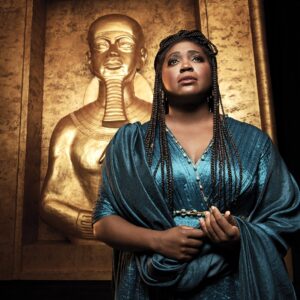
The 19th-century Italian composer Giuseppe Verdi — who kept the scores of Beethoven’s string quartets on a shelf near his bed, shared a birth year with Wagner (whom he disliked), and wrote 26 operas before his death at 87 in 1901 — was paid a hefty sum, more than $500,000 in today’s money, to write the grand opera Aida, a love story set in ancient Egypt. It remains an indispensable part of the opera canon today.
This season’s Metropolitan Opera: Live in HD series continues with a simulcast of Aida at Wellfleet Harbor Actors Theater (2357 Rt. 6) on Saturday, Jan. 25, at 12:30 p.m. Soprano Angel Blue will make her Met debut as the Ethiopian princess Aida. Mezzo-soprano Judit Kutasi will play Aida’s Egyptian rival, Amneris, and tenor Piotr Beczała is the soldier Radamès. Music director Yannick Nézet-Séguin will conduct the cast and orchestra in four acts involving deception, heroism, love, and loss on a grand and glittering scale.
Verdi never went to Egypt. Instead, his imagination was kindled by research conducted from Europe. (He didn’t even attend the premiere of the opera in Cairo on Christmas Eve in 1871; a second premiere was held in Milan on Feb. 8, 1872, which he did attend.) The result was a romantic tragedy steeped in exoticism, set to Verdi’s lush score for a full orchestra featuring mighty brass, with a chorus of some 80 singers and eight principal roles.
Tickets are $15-$27. See what.org for information. —Dorothea Samaha
Cello and Piano at the Museum
When Elizabeth Miya Jones was seven, her parents took her to Marlboro, Vt. to see a chamber concert. Before the performance, Jones sat in on the group’s rehearsal. “I remember hearing the sound of the cello,” she says. “I got up and moved closer.” Now, she says, “I’ve been working my whole life to get to the sound that I heard.”

Jones will be playing the cello at the Cape Cod Museum of Art (60 Hope Lane, Dennis) this Sunday, Jan. 26, at 3:30 p.m., accompanied by her mother, pianist Stella Simakova.
Jones is from Greenwich, Conn. and is currently a second-year dual-degree student at Harvard and the New England Conservatory. Though Simakova has long accompanied her daughter’s performances, that opportunity is rarer now because of school. “Performing together is very special,” Simakova says.
Their familial connection translates into a musical connection. “We have an understanding of what the other wants to do,” Jones says. “We’ve gotten better at listening to each other, especially as I’ve gotten older.”
“I’m so lucky to have Elizabeth,” says Simakova. “She has really great musical intuition.” Jones has similar sentiments. “My mother’s been playing music far longer than I have,” she says. “She has all this incredible insight.”
Sunday’s concert includes pieces from three distinct musical eras: Baroque, Classical, and Romantic. Jones will open with what she calls a “show piece” by Girolamo Frescobaldi, arranged by cellist Gaspar Cassadó. Next is the first movement of Haydn’s Cello Concerto No. 2 in D major, in which Jones will premiere her own original cadenza, a virtuosic solo passage.
She’ll conclude the program with Rachmaninoff’s Cello Sonata in G minor. “It’s one of the all-time great romantic pieces for cello,” says Jones. “It’s a huge piece. I’ve wanted to play the whole thing for a long time.”
“Some cellists look forward their whole life to playing this,” says Simakova. “I’ve been looking forward my whole life to playing this with my daughter.”
Tickets are $24 ($18 for CCMoA members) at ccmoa.org. —Eve Samaha
From Rome to Cape Cod
The Cape Symphony Orchestra will transport audiences to Italy in a concert titled “Passport to Rome” at the Barnstable Performing Arts Center (744 West Main St., Hyannis) on Saturday, Jan. 25 at 7:30 p.m. and Sunday, Jan. 26 at 3 p.m. Guest conductor Darko Butorac will lead the orchestra.
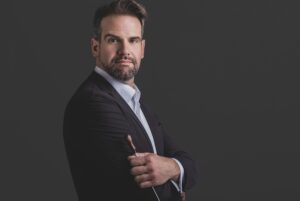
The program features music by three composers with connections to Italy and the Eternal City. The concert will open with Gioachino Rossini’s overture to La Gazza Ladra (The Thieving Magpie), an opera semiseria — a lighthearted drama — which premiered in 1817. Scored for symphony orchestra with plenty of percussion, the overture marches, dances, and even seems to laugh.
Next are two 18th-century concertos by Antonio Vivaldi: one for oboe and bassoon, with soloists Jillian Honn and Meryl Summers, and one for two cellos, with soloists Jacques Lee Wood and Velleda Miragias. Vivaldi wrote over 500 instrumental concertos; in all of them, the soloists seem to be conversing. Here, the oboe and bassoon talk over each other in friendly conversation while the two cellos argue passionately, agree emphatically, and apologize to each other in delicate tones.

Last on the program are two works by Ottorino Respighi, the most contemporary of the composers; he died in 1936. His Fountains of Rome was composed in 1916 and Pines of Rome in 1924. Both are grand, evocative tone poems that sonically illustrate pine trees and fountains: timeless visions that are unmistakably Italian.
Tickets are $32 to $75 at capesymphony.org. —Dorothea Samaha
Confronting the History of Slavery on Cape Cod
“Every town on Cape Cod had slaves,” says author Michael V. Pregot, referencing the research for his 2024 book, Slavery and Abolitionism on Cape Cod: A Massachusetts Incongruity. The Brewster resident will discuss his book at the Truro Public Library (7 Standish Way) on Saturday, Jan. 25 at 2 p.m.
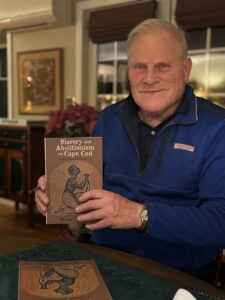
Pregot’s book focuses on the role of sea captains and other key actors in the slave economy before, during, and after the passage of three Massachusetts Supreme Judicial Court rulings in 1781-1783 that ended slavery “as effectively as it can be,” in the words of one judge. Pregot’s previous book about the Cape’s captains led to his interest in the role they played in helping slaves escape from Southern plantations.
“The Underground Railroad is really a misnomer, because more than half of the people used maritime routes to escape,” Pregot notes. “They would get to Philadelphia or New York or somewhere in Maryland and then sail to Provincetown. And it was very common for the fishermen going up to Canada, to Nova Scotia and New Brunswick, to carry slaves up on that escape route.”
One such captain, Prince Sears Crowell (1813-1881) of Sandwich, became wealthy transporting plantation cotton to the Northeast before turning to abolitionism. The cover of Pregot’s book reproduces an illustration of an enslaved Black person kneeling in chains that Capt. Crowell used on collection boxes he placed in Massachusetts towns to gather funds to benefit anti-slavery causes. While the image shows a passive figure appearing to pray or beg for freedom, Pregot’s book notes that the court cases resulting in Massachusetts’s first-in-the-nation free-state status were brought by slaves themselves, men and women bold enough to demand emancipation.
Federal law, however, continued to prohibit aiding slaves in free states, prompting many to flee to Canada to escape capture and being returned to the American South. Capt. Jonathan Walker (1799-1878) of Harwich served a year in prison after trying to help seven runaway slaves escape from Florida to the Bahamas. His boat was seized, the fugitives were returned to their enslavers, and Walker’s palm was branded with the letters “SS” for “slave stealer.”
The Cape hosted the largest anti-slavery conference of the era in 1848, which turned violent when local residents objected to attacks on religious leaders and institutions. William Lloyd Garrison, Lucy Stone, and other leading abolitionists delivered speeches in an outdoor area believed to be in modern-day Harwich Port, and Frederick Douglass chastised ministers who condemned slavery from the pulpit while allowing wealthy slave-owning families to remain prominent members: “The church is responsible for the persistence of slavery,” he declared. “It has shamelessly given the sanction of religion and the Bible to the whole slave system.”
While some Cape sea captains opposed slavery or converted to the abolitionist cause, others fully engaged in the trafficking of human beings. But regardless of an individual’s personal views, Pregot says, the institution of slavery brought financial rewards for many.
“Almost all New England sea captains to one degree or another profited directly or indirectly from the slave trade,” he says. “Some of them brought cotton back to New England, some of them sold low-grade fish to the plantations. There were lots of connections, even if they weren’t actual slavers.”
See trurolibrary.org for more information on Pregot’s talk. —Katy Abel
Photographs That Speak of Hope in Dark Times
During the first isolated months of the pandemic, large painted hearts began to appear on town buildings, homes, and businesses around the Outer Cape. Signaling love, encouragement, support, and, later, political solidarity, the images caught the imaginations of North Truro artist and writer Rachael Sokolowski and Harwich photographer Suz Karchmer.
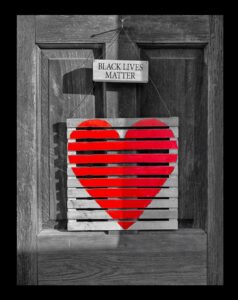
In a phone conversation, the friends realized they were pursuing similar documentary projects and decided to work together. Their photographs depict a wave of public art — what they call “a testament to a community coming together when the world was unraveling.” Thirty-seven of the photos are currently on view in the exhibition “Take Heart: A Cape Cod Love Story” at the Truro Public Library (7 Standish Way).
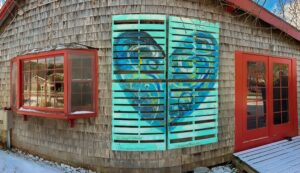
Over the course of their project, Karchmer and Sokolowski learned that the local heart displays began around April 2020 when a social media post by Truro’s Savory & the Sweet Escape restaurant showed a heart intended to signal support for health-care workers outside a Scituate police station.
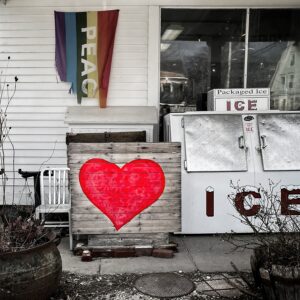
“The hearts were people’s expressions of love, joy, hope, and whatever positive affirmation there was to say,” Karchmer says. “People who passed by had no idea what their purpose was and took from it what they wanted.”
Images in the exhibition show hearts on highway posts, lawns, fences, and store windows. The word “hope” appears in many of the earlier images, while later ones include slogans like “Black Lives Matter,” pleas for peace, and messages of LGBTQ support. While Karchmer favors close-up views of her subjects, Sokolowski created more distanced environmental views. But each experimented with the other’s viewpoints and methods.
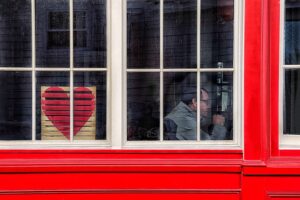
The exhibition at the library is on view through January, with an artist talk scheduled for Thursday, Jan. 23 at 6 p.m. It will be on view at Brewster Ladies Library in February, with a reception on Saturday, Feb. 1 at 2 p.m. The artists are planning to self-publish a book of the photos for Valentine’s Day, with hope of carrying the project’s spirit into “an uncertain future.”
See trurolibrary.org for information. —Kathi Scrizzi Driscoll
Bringing Writers and Readers Together
Named for the address of the Fine Arts Work Center campus in Provincetown, 24PearlStreet is FAWC’s online home for programs connecting writers and readers. Offering a year-round selection of classes, workshops, and seminars taught by FAWC faculty and visiting instructors, the program also presents Wilder Words, a quarterly virtual reading series. The first reading of 2025 will take place online on Thursday, Jan. 30 at 6 p.m.

Four members of the FAWC winter faculty from a variety of backgrounds will read selections from their work. Didi Jackson, who teaches creative writing at Vanderbilt University in Nashville, Tenn., has published the poetry collections My Infinity (2024) and Moon Jar (2020), and her work has appeared in publications including American Poetry Review, the New Yorker, and Oxford American. Carl Phillips, whose anthology Then the War: And Selected Poems 2007-2020 won the 2023 Pulitzer Prize for poetry, is currently based on Cape Cod after teaching at Washington University in St. Louis for 30 years. Susanna Sonnenberg, a FAWC summer faculty member since 2017 who currently lives in Missoula, Mont., has published the memoirs Her Last Death and She Matters: A Life in Friendships. Chicago-based writer Ruben Quesada, whose latest poetry collection, Brutal Companion, was published in October 2024, is the editor of the anthology Latinx Poetics: Essays on the Art of Poetry. All four readers will also be teaching individual writing workshops during 24PearlStreet’s current semester.
The Wilder Words reading on Jan. 30 is free and open to the public. Registration is required. See fawc.org for information. —John D’Addario



